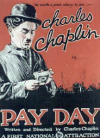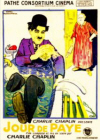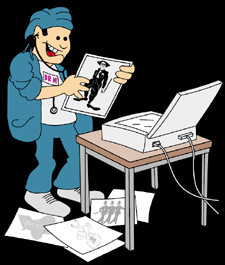
 Charlie
plays a laborer. When he comes to work late, he gives the foreman
a white lily to make up for his tardiness, and then starts his job of
shoveling dirt. He does this so slowly that the foreman sends him
to work in the bricklaying section instead. There he works too
fast; his co-workers cannot keep up with him. Charlie flirts
unsuccessfully with the foreman's daughter when she brings her father
his lunch.
Charlie
plays a laborer. When he comes to work late, he gives the foreman
a white lily to make up for his tardiness, and then starts his job of
shoveling dirt. He does this so slowly that the foreman sends him
to work in the bricklaying section instead. There he works too
fast; his co-workers cannot keep up with him. Charlie flirts
unsuccessfully with the foreman's daughter when she brings her father
his lunch.
It is pay day and Charlie tells his foreman that he believes he has been
underpaid. By the time their argument is over, Charlie has only
succeeded in making the foreman believe that he has been overpaid.
Charlie tries to hide some of his pay from his wife. She finds it,
but he manages to get some money out of her purse, and goes to a saloon,
which he later leaves in the company of some friends. They
begin singing in an alley. Water is thrown on the group, but
Charlie protects himself from the shower with an umbrella and goes right
on singing.
Charlie gets on the back of a streetcar to get home, but is pushed up
front by others until eventually he is back on the street. He at
long last reaches his home and undresses just as the alarm clock goes
off. His wife wakes up, and he pretends that he has just awakened and is
getting dressed. His wife is not deceived. Charlie jumps
into the bathtub to hide, unaware that it is filled with water.
His wife, armed with a rolling pin, finds him, and the poor man loses
another battle.
What was said about
Pay Day:
The
New York Times
A new Chaplin comedy, of course, is an event in the motion picture
world, and all that the reviewer has to do is announce it. The
rest may as well be silent so far as he is concerned, because nothing
can be said about Chaplin that has not been said a dozen times already,
and most people are not interested in what is said about him, anyhow.
They just go to see him and laugh-and some—of them understand.
_NRFPT_02_small.jpg)
_NRFPT_01_small.jpg) It may not be entirely futile to report, however, that this new Chaplin
comedy is one of his best. It is not to be ranked with
The Kid, which was a longer and more penetratingly
serious venture, and it has not the significance, perhaps, of
Shoulder Arms, but it has enough pure fun, and sufficient satire,
too, for anyone. With or without reference to anything else, it
is something else; it is something to relish for its own
sake.
It may not be entirely futile to report, however, that this new Chaplin
comedy is one of his best. It is not to be ranked with
The Kid, which was a longer and more penetratingly
serious venture, and it has not the significance, perhaps, of
Shoulder Arms, but it has enough pure fun, and sufficient satire,
too, for anyone. With or without reference to anything else, it
is something else; it is something to relish for its own
sake.
Underlying the picture's surface buffoonery is that refreshing treatment
of the commonplace by which Chaplin has so often exposed the irony of
life. He shows the gods grinning at human earnestness, yet he does
not join them in mocking it. He is part of humanity, but has the
feelings and the aspirations of ordinary men; he is sympathetically one
of the crowd. But he sees the fatuity of it all, too, and so is
one above the crowd.
Photoplay
If we ever get to the point where
Charlie Chaplin fails to make us laugh, we are going right out
and order a nice, large, beautifully engraved tombstone. There
will be nothing left in life for us. We would blame ourselves, not
Charlie. Pay Day made even the ushers laugh in the theatre
where we saw it. Ushers see a picture more times than anybody
else, excepting the policemen. It had been running almost all week
when we saw the ushers laugh. We can never hope to offer a
critique as poignant as this. And Charles Spencer's
epitaph could not be more glorious than "He made even ushers chuckle."
